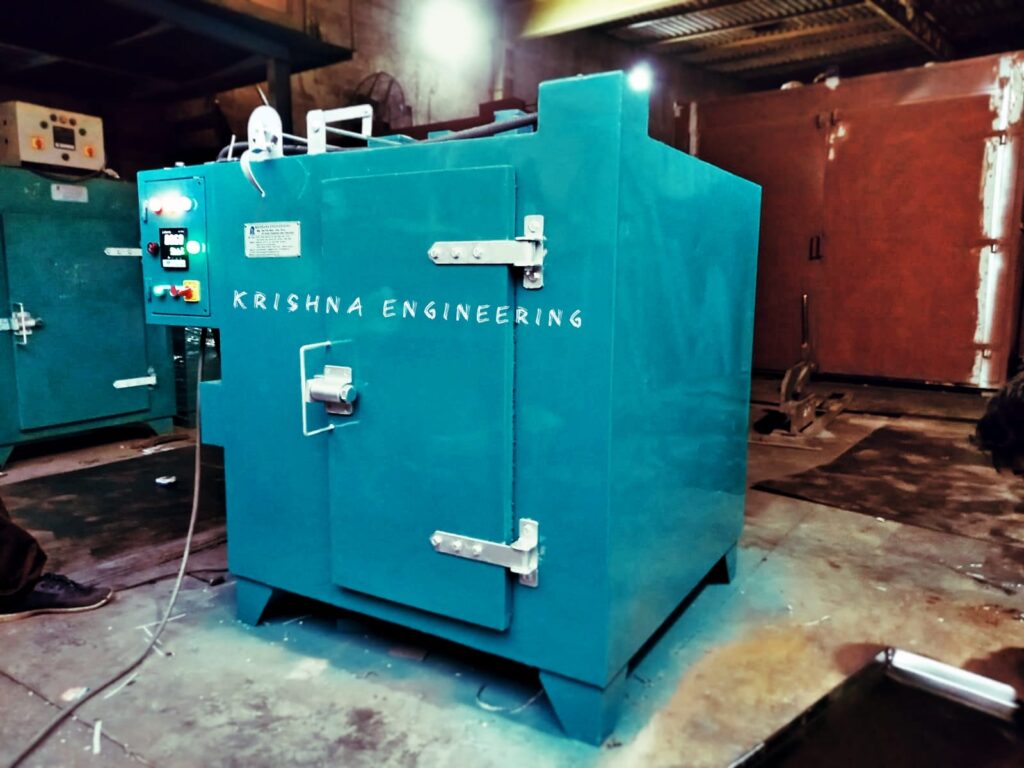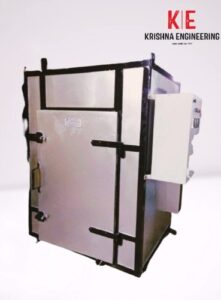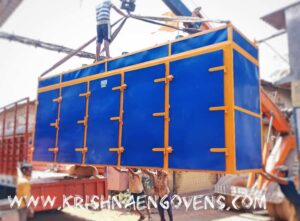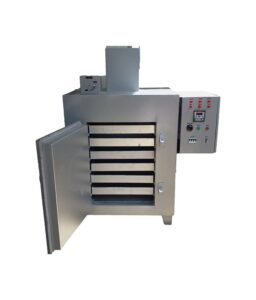What is Steam Tray Dryer?
A steam tray dryer, also known as a steam heated tray dryer, is a type of drying equipment that uses steam as the heating medium to remove moisture from materials or products. It is commonly used in various industries for drying applications where steam is readily available and preferred as a heat source.

To start with, you must know the difference between this type of dryer and other types. The main purpose of a Steam tray is to use hot water to steam the clothes without touching the fabric directly. As such, there is no danger of the fibres in your clothes being ruined as the steam rapidly warms them up.
The basic working principle of this incredible machine is the continuous circulation of hot air. In the tray dryer, moisture is removed from the solids that are placed in the tray by a forced convectional heating. The moist air is removal is conducted partially but in a simultaneous fashion.
Here’s a general overview of how a steam tray dryer works:
Construction: A steam tray dryer consists of a drying chamber or cabinet that contains multiple trays or shelves. The chamber is typically made of stainless steel or other heat-resistant materials to withstand high temperatures and resist corrosion.
Steam Supply: Steam is generated by a steam generator or boiler located outside the drying chamber. The steam is then supplied to the dryer through pipes or conduits. The steam is usually dry and saturated to ensure efficient heat transfer and uniform drying.
Heat Transfer: Steam is passed through heat exchangers or steam coils located within the drying chamber. The steam releases its latent heat as it condenses on the heat exchangers or coils, transferring heat to the drying chamber and the materials on the trays.
Temperature Control: Steam tray dryers have temperature controls and sensors to regulate and maintain the desired drying temperature. The temperature is controlled by adjusting the steam flow rate and controlling the steam pressure within the dryer.
Air Circulation: Steam tray dryers may incorporate a fan or blower system to circulate air within the drying chamber. The circulation of air helps distribute heat evenly, ensuring uniform drying across the trays.
Drying Process: The material to be dried is spread out on the trays in a thin layer. Steam heat is transferred to the material, causing moisture to evaporate. The moisture-laden air is typically exhausted from the drying chamber through vents or ducts, allowing fresh steam to continue the drying process.
Monitoring and Adjustments: Operators monitor the drying conditions, including temperature, steam flow rate, and drying time. Adjustments can be made as needed to ensure optimal drying performance and prevent under-drying or over-drying of the material.
Unloading: Once the drying process is complete, the trays can be removed from the drying chamber, and the dried material can be unloaded. Further processing or packaging may be required depending on the specific material and its intended use.
Steam tray dryers offer advantages such as precise temperature control, efficient heat transfer, and the ability to utilize readily available steam as a heating medium. They are commonly used in industries such as food processing, pharmaceuticals, chemicals, and agricultural processing, where steam is widely used and preferred for its clean and controlled heat transfer characteristics.
Worldwide Exports Location:
Following Countries: Afghanistan, Albania, Algeria, Andorra, Angola, Antigua And Barbuda, Argentina, Armenia, Australia, Austria, Azerbaijan, Bahamas, Bahrain, Bangladesh, Barbados, Belarus, Belgium, Belize, Benin, Bhutan, Bolivia, Bosnia And Herzegovina, Botswana, Brazil, Brunei, Bulgaria, Burkina Faso, Burundi, Cabo Verde, Cambodia, Cameroon, Canada, Central African Republic (CAR), Chad, Chile, Colombia, Comoros, Democratic Republic Of The Congo, Republic Of The Congo, Costa Rica, Cote D’Ivoire, Croatia, Cuba, Cyprus, Czech Republic, Denmark, Djibouti, Dominica, Dominican Republic, Ecuador, Egypt, El Salvador, Equatorial Guinea, Eritrea, Estonia, Ethiopia, Fiji, Finland, France, Gabon, Gambia, Georgia, Germany, Ghana, Greece, Grenada, Guatemala, Guinea, Guinea-Bissau, Guyana, Haiti, Honduras, Hungary, Iceland, India, Indonesia, Iran, Iraq, Ireland, Israel, Italy, Jamaica, Japan, Jordan, Kazakhstan, Kenya, Kiribati, Kosovo, Kuwait, Kyrgyzstan, Laos, Latvia, Lebanon, Lesotho, Liberia, Libya, Liechtenstein, Lithuania, Luxembourg, Macedonia (FYROM), Madagascar, Malawi, Malaysia, Maldives, Mali, Malta, Marshall Islands, Mauritania, Mauritius, Mexico, Micronesia, Moldova, Monaco, Mongolia, Montenegro, Morocco, Mozambique, Myanmar (Burma), Namibia, Nauru, Nepal, Netherlands, New Zealand, Nicaragua, Niger, Nigeria, North Korea, Norway, Oman, Pakistan, Palau, Palestine, Panama, Papua New Guinea, Paraguay, Peru, Philippines, Poland, Portugal, Qatar, Romania, Russia, Rwanda, Saint Kitts And Nevis, Saint Lucia, Saint Vincent And The Grenadines, Samoa, San Marino, Sao Tome And Principe, Saudi Arabia, Senegal, Serbia, Seychelles, Sierra Leone, Singapore, Slovakia, Slovenia, Solomon Islands, Somalia, South Africa, South Korea, South Sudan, Spain, Sri Lanka, Sudan, Suriname, Swaziland, Sweden, Switzerland, Syria, Taiwan, Tajikistan, Tanzania, Thailand, Timor-Leste, Togo, Tonga, Trinidad And Tobago, Tunisia, Turkey, Turkmenistan, Tuvalu, Uganda, Ukraine, United Arab Emirates (UAE), United Kingdom (UK), United States Of America (USA), Uruguay, Uzbekistan, Vanuatu, Vatican City (Holy See), Venezuela, Vietnam, Yemen, Zambia, Zimbabwe.
India Location –
Maharashtra, Mumbai, Pune, Nagpur, Nashik, Virar, Palghar, Aurangabad, Bhiwandi, Thane, Amravati, Malegaon, Kolhapur, Nanded, Sangli ,Jalgaon, Akola, Latur, Ahmadnagar, Dhule, Ichalkaranji, Chandrapur, Parbhani, Jalna, Bhusawal, Navi Mumbai, Raigad, Panvel, Bangalore, Karnataka, Ahmedabad, Gujarat, Chennai, Tamil Nadu, Surat, Coimbatore, Vadodara, Indore, Madhya Pradesh, Bhubaneswar, Orissa, Hyderabad, Andhra Pradesh, Jamshedpur, Jharkhand, Kolkata, West Bengal ,Delhi, Jaipur, Rajasthan, Kochi, Kerala, Chandigarh, Punjab, Dehradun, Uttarakhand , Lucknow, Uttar Pradesh, Visakhapatnam, Andhra Pradesh, Guwahati, Assam, Amritsar, Mangalore, Noida, Gurgaon, Haryana, Bhopal, Madhya Pradesh, Aurangabad, Faridabad, Allahabad, Prayagraj, Jodhpur.




